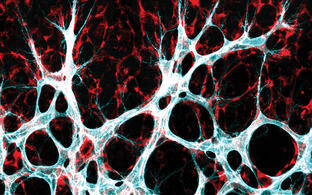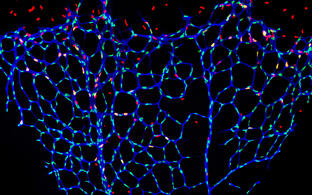
Potente Lab
Angiogenesis & Metabolism Laboratory
Profile
We study how vascular cells sense metabolic signals and how they use this information to build networks of organ-specific size, shape and differentiation. We are also interested in the metabolism of these cells. Defining the nutrients that they use and the metabolites they produce may reveal mechanisms through which altered metabolism influences vascular function in development and disease. Our goal is to identify regulatory principles whose disruption drives vascular pathology.
We use various genetic, biochemical and imaging technologies, which allow us to define the role of single metabolites, genes, and cells in vitro and in vivo with high spatio-temporal resolution. In the past, this has led to important scientific discoveries at the interface of developmental biology, metabolism and cell signaling. For instance, we revealed that nutrient-sensitive protein modifications control the signaling dynamics of essential angiogenic pathways such as Notch and that changes in the levels of these modifications adjust vascular patterning. We also identified molecular determinants of vascular metabolic activity, including the transcriptional regulators YAP/TAZ and MYC, which prepare endothelial cells for growth and proliferation. Moreover, we uncovered essential metabolic pathways limiting blood vessel expansion and described the forkhead transcription factor FOXO1 as a central coordinator of these programs.
Overall, our laboratory emphasizes collaboration and prioritizes approaches that can inform about fundamental biological principles while also pointing the way towards clinical insight.
For further information, please visit our lab webpage (www.angio-met-lab.com).
Team
Group Leader
Members
- Dr. Jorge Andrade
- Dr. Marco Castro
- Joseph Lim
- Sara Gillnäs
- Dr. Yang Zhang
Selected publications
Research articles
- Ong YT, Andrade J, Armbruster M, Sugino T, Eelen G, Wilhelm K, Shi C, Zimmermann B, Watanabe S, Guenther S, Schneider A, Kaulich M, Pan DJ, Braun T, Gerhardt H, Efeyan A, Carmeliet P, Piccolo S, Grosso AR, Potente M (2022). A YAP/TAZ-TEAD signalling module links endothelial nutrient acquisition to angiogenic growth. Nature Metabolism 4: 672-682.
- Ren AA, Snellings DA, Su SY, Hong CC, Castro M, Tang AT, Detter MR, Hobson N, Girard R, Romanos S, Lightle R, Moore T, Shenkar R, Benavides C, Beaman MM, Mueller-Fielitz H, Chen M, Mericko P, Yang J, Sung DC, Lawton MT, Ruppert M, Schwaninger M, Körbelin J, Potente M, Awad I, Marchuk DA, Kahn ML (2021). PIK3CA and CCM mutations fuel cavernomas through a cancer-like mechanism. Nature 594: 217-276.
- Andrade J, Shi C, Costa ASH, Choi J, Kim J, Sugino T, Doddaballapur A, Ong YT, Zimmermann B, Castro M, Kaulich M, Guenther S, Kubota Y, Braun T, Koh GY, Grosso AR, Frezza C, Potente M (2021). Control of endothelial quiescence by FOXO-regulated metabolites. Nature Cell Biology 23: 413-423.
- Luo W, Garcia-Gonzalez I, Férnandez-Chacón M, Casquero-Garcia V, Sanchez-Muñoz MS, Mühleder S, Garcia-Ortega L, Andrade J, Potente M, Benedito R (2021). Arterialization requires the timely suppression of cell growth. Nature 589: 437-441.
- Lim R, Sugino T, Nolte H, Andrade J, Zimmermann B, Shi C, Doddaballapur A, Ong YT, Wilhelm K, Fasse JWD, Ernst A, Kaulich M, Husnjak K, Boettger T, Guenther S, Braun T, Krueger M, Benedito R, Dikic I, Potente M (2019). Deubiquitinase USP10 regulates Notch signaling in the endothelium. Science 364: 188-193.
- Yu P, Wilhelm K, Dubrac A, Tung JK, Alves TC, Fang JS, Xie Y, Zhu J, Chen Z, De Smet F, Zhang J, Jin S-W, Sun L, Sun H, Kibbey RG, Hirschi KK, Hay N, Carmeliet P, Chittenden TW, Eichmann A, Potente M, Simons M (2017). FGF-dependent metabolic control of vascular development. Nature 545: 224-28.
- Wilhelm K, Happel K, Eelen G, Schoors S, Oellerich MF, Lim R, Zimmermann B, Aspalter IM, Franco CA, Boettger T, Braun T, Fruttiger M, Rajewsky K, Keller C, Bruning JC, Gerhardt H, Carmeliet P, Potente M (2016). FOXO1 couples metabolic activity and growth state in the vascular endothelium. Nature 529: 216-20.
- Boon RA, Iekushi K, Lechner S, Seeger T, Fischer A, Heydt S, Kaluza D, Treguer K, Carmona G, Bonauer A, Horrevoets AJ, Didier N, Girmatsion Z, Biliczki P, Ehrlich JR, Katus HA, Muller OJ, Potente M, Zeiher AM, Hermeking H et al. (2013). MicroRNA-34a regulates cardiac ageing and function. Nature 495: 107-10.
- Guarani V, Deflorian G, Franco CA, Kruger M, Phng LK, Bentley K, Toussaint L, Dequiedt F, Mostoslavsky R, Schmidt MH, Zimmermann B, Brandes RP, Mione M, Westphal CH, Braun T, Zeiher AM, Gerhardt H, Dimmeler S, Potente M (2011). Acetylation-dependent regulation of endothelial Notch signalling by the SIRT1 deacetylase. Nature 473: 234-8.
- Bonauer A, Carmona G, Iwasaki M, Mione M, Koyanagi M, Fischer A, Burchfield J, Fox H, Doebele C, Ohtani K, Chavakis E, Potente M, Tjwa M, Urbich C, Zeiher AM, Dimmeler S (2009). MicroRNA-92a controls angiogenesis and functional recovery of ischemic tissues in mice. Science 324: 1710-3.
Review articles
- Potente M, Mäkinen, T (2017). Vascular heterogeneity and specialzation in development and disease. Nature Reviews Molecular Cell Biology 18: 477-94.
- Potente M, Carmeliet P (2017). The link between angiogenesis and endothelial metabolism. Annual Review of Physiology 79: 43-66.
- Potente M, Gerhardt H, Carmeliet P (2011). Basic and therapeutic aspects of angiogenesis. Cell 146: 873-87.






